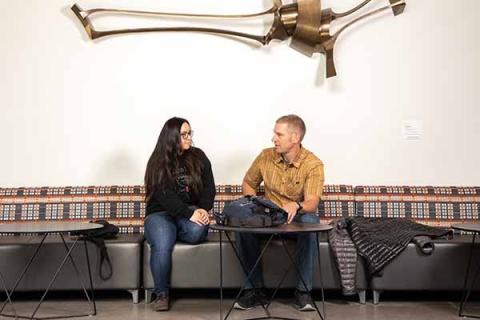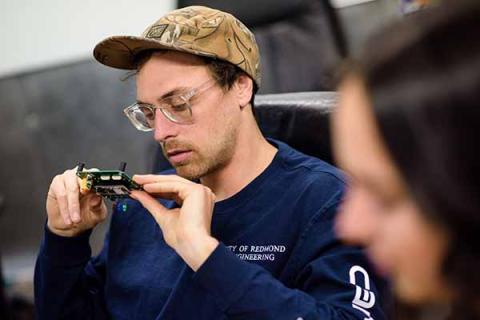
Energy Systems Engineering
Energy Systems Engineering
Description
We are OSU's campus in Bend. That means we bring the excellence of OSU's College of Engineering to our energy systems engineering program — including world-class professors and the quality of education that only OSU delivers.
What is Energy Systems Engineering? The bachelor of science in energy systems engineering combines engineering fundamentals with energy-focused technical courses and business management classes. This multidisciplinary curriculum provides students with a strong foundation in the core principles of mechanical, electrical and industrial engineering. Our energy systems engineering degree is one of only six of its kind in the U.S.
Courses in energy consumption, distribution, storage, conversion, policy, and business management help prepare students for rewarding technical careers in the broad energy field.
Program Information
Degree Requirements
A total of 180 quarter credits are required to graduate, including 60 upper-division credits. Requirements include:
- OSU Core Education
- Energy Systems Engineering Major requirements
- Math and Science Courses
- Business Management Courses
- Engineering Courses
Planning and Resources
Energy Systems Engineering Sample 4-Year Academic Plan
Transfer Guides to plan your transfer from an Oregon Community College into OSU-Cascades Energy Systems Engineering program.
Academic Progression Model
Academic Progression Model requires students to maintain a 2.5 OSU GPA and earn 65% of the credits they attempt at OSU. College-specific progression standards apply to all students in the College of Engineering. These standards relate to staying in good academic standing within your major and are different from staying in good standing with OSU.
Undergraduate Academic Progression Model
Using the following course forecast information students will plan ahead and work with their advisor to create and update academic plans.
Once you complete this program, discover all the learning outcomes you'll achieve.
95%
Since 2012, our graduates have seen 95% job placement
Intern
Take advantage of partnerships between OSU's engineering programs and industry
With an average of 20 students per class, we get to know you — by name
You can expect:
- Personal relationships with professors as part of a small classroom setting
- Hands-on work using state-of-the art equipment and simulators in seventeen different courses
- Real-world applications from faculty with 50 years combined industry experience
- Exposure to industry-standard engineering software and programming languages
- To help solve a problem for an industry sponsor in Capstone Design
- Undergraduate research
- Internship opportunities
Take on a challenge no one else has done. Work with industry on a real-world project. Learn from faculty who will know you and help you achieve your career goals. And most OSU-Cascades grads are working engineers within six months.

Gertrude Villaverde, ESE '19, is one of the first OSU-Cascades admitted students to graduate with the Honors Baccalaureate.

Creating an air quality monitor prototype was an ideal capstone project for energy systems engineering seniors.
You'll be job ready
Energy systems engineers design devices, processes and systems used to convert, distribute and store energy. It is a broad field with many opportunities. Our alumni are working at many different companies and in a variety of roles including:
- Project engineer at Deschutes Brewery
- Design engineer at BasX
- Power systems engineer at Eaton
- Power engineer at Pacific Power
- Production manager at EarthCruiser
- Manufacturing engineer at Bend Research, Inc
- Mechanical engineer at OnBoard Dynamics
What do you like about the program?
What is Energy Systems Engineering?
Request More Info